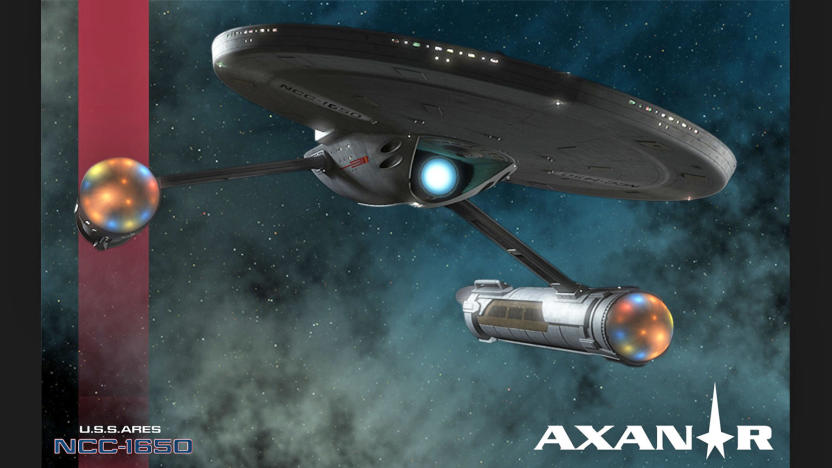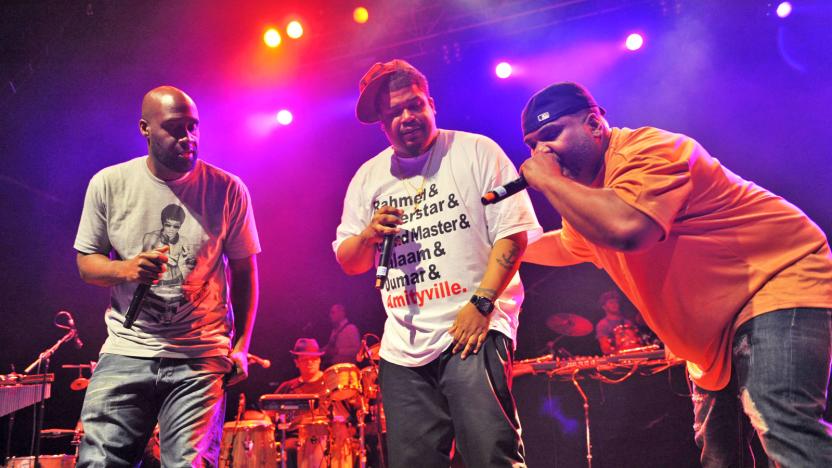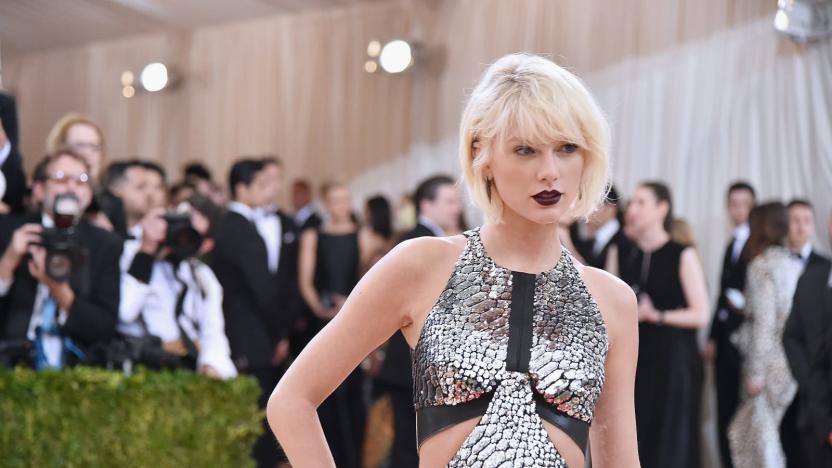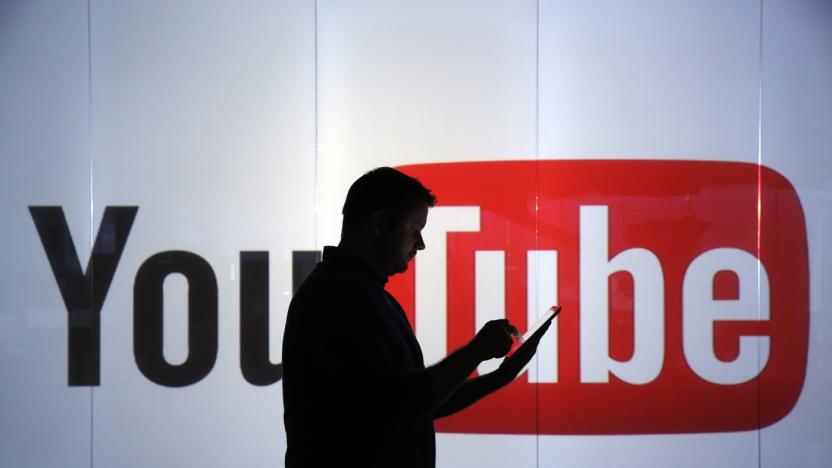copyright
Latest

'Fully loaded' Kodi box seller pleads not guilty
Whether the makers of Kodi (by now you should know that's the new name for what used to be XBMC) like it or (definitely) do not, people have built businesses around preloading their software on players like a Fire TV stick and advertising it as an avenue for watching pirated video streams. Over in the UK, the authorities raided Brian Thompson's Cut Price Tomo TV's and have charged him with two offenses under the Copyright, Designs and Patents Act. Now, as TorrentFreak explains, the court will decide what role Thompson played in any potential copyright infringement by the people who purchased the devices.

CBS and Paramount settle lawsuit with 'Star Trek' fan film
It's been a wild ride for the folks behind the Axanar Star Trek fan film, but it's finally over -- the fan production group has settled its lawsuit with CBS and Paramount. The terms of the agreement aren't completely clear, but both parties have announced that the deal will allow Axanar productions to finish and release its fan film for free as long as a certain number of undisclosed "substantial changes" are made. Even better? According to Ars Technica, the settlement doesn't require the fan group to pay damages, either.

UK ISPs will soon send written warnings to suspected pirates
UK ISPs will begin sending out emails to subscribers later this month, warning them of movie, TV and music piracy identified on their connection and pointing them to legal content sources. All four major providers -- Sky, BT, Virgin Media and TalkTalk -- have agreed to the Voluntary Copyright Alert Programme, an anti-piracy initiative that's been in the works since the summer of 2014. It's the active component of Creative Content UK, a partnership between copyright holders, the government and ISPs that aims to combat digital piracy in an educational, non-threatening way.

'Star Trek' fan film loses fair use case, moves to jury trial
It's been a long journey for the makers Axanar, the crowdfunded Star Trek fan film that ran afoul of CBS and Paramont's lawyers. After successfully raising over a million dollars to to create a professional-grade homage to the Star Trek brand, Axanar's producers were hit with a lawsuit, assured that lawsuit would be dropped, and then taken to court. The filmmakers stood their ground and argued a case of fair use, but ultimately lost. Today, U.S. District Court Judged Gary Klausner ruled that Axanar is just too faithful to Star Trek canon to avoid copyright infringement.

Facebook is building a tool to hunt copyright infringing videos
YouTube isn't the only site record labels are taking issue with when it comes to copyright infringement. Financial Times reports that music publishers want Facebook to license music that gets posted on its site and take down any user-submitted videos that contain copyrighted content. The first step is said to be handling all the copyrighted material that's posted to the site's News Feed in the form of cover songs and other footage. As part of the effort, Facebook is said to be working on a copyright identification system, similar to YouTube's Content ID, to help police what's published.

SoundCloud won't take down DJ mixes
SoundCloud made its name partly on the back of DJ mixes (both official and otherwise), but you could never take their presence for granted. All it would take is an overeager copyright lawyer and your favorite set would disappear in a puff of digital smoke. That shouldn't be a problem going forward, though. Company co-founder Eric Wahlforss tells Germany's Groove that it's now possible to upload mixes "problem-free." The rights negotiations for SoundCloud Go made all the difference, Wahlforss says -- agreements with copyright holders mean that there won't be any rude legal surprises, whether or not you're a Go subscriber.

YouTube deal ends years-long fight over music videos in Germany
German music fans haven't had it easy in the past 7 years. A royalty dispute with music rights group GEMA has forced YouTube to block thousands of music videos in the country, leaving locals no choice but to either find alternative video sources or (gasp) settle for audio alone. At last, though, they can relax: GEMA and YouTube have reached a deal that makes sure GEMA members get paid for video streams. The exact terms of the deal aren't public, but it'll cover both the usual ad-supported free viewing as well as the eventual European launch of YouTube Red subscriptions.

Cisco says it can cut live pirate video streams
It's relatively easy for content providers to take down pirated videos when they're uploaded to the web, but stopping live streams is another matter. Just ask anyone who has watched a bootleg stream for a pay-per-view boxing match or the Super Bowl -- new streams usually pop up faster than the copyright holders can take them down. The party might soon be over, however. Cisco has created a new technology, Streaming Piracy Prevention, that promises to automatically cut off illegal live feeds.

EU digital rules promise 5G, free WiFi and tougher copyright
The European Union isn't done stepping up its digital initiatives. Officials have outlined proposed policies that are focused on dramatically increasing access to both the internet and the content you'll find on it. Most of the proposals will be helpful, although not everyone is a fan -- there are copyright changes that are rubbing Google the wrong way.

De La Soul's samples are why its classic albums stay offline
Have you wondered why De La Soul is more than happy to offer its newer albums online, but has had so much trouble getting its classics (Stakes Is High and earlier) online that it gave them away at one point? You now have a good, if imperfect, explanation. Their label, Warner Music Group, tells the New York Times that its staff "don't believe it is possible" to clear all the samples in early tracks for digital music services. It doesn't explain why those samples are being held back, but the group's current sample clearance agent suspects that many of those samples may have been cleared improperly, sometimes through informal agreements. It's also possible that many of the sample deals didn't account for non-physical releases, so Warner might have to start from scratch.

Google defends its anti-piracy efforts
If you believe Trent Reznor and a good chunk of the music industry, Google (particularly YouTube) is a giant piracy machine -- it's allegedly doing little to block stolen content, and knowingly profits from it. Google isn't having any of that talk, though. The search firm just published an updated report detailing its anti-piracy efforts, and it maintains that it's doing a lot to fight bootleggers. It's adamant that its Content ID system (which can automatically claim copyrighted material for licensing or takedowns) does wonders for the media business. The technology has paid over $2 billion to copyright owners since launch, and about 98 percent of copyright action uses it -- just 2 percent comes down to formal copyright removal notices.

Blizzard sues an 'Overwatch' cheat developer
Blizzard has about as much interest in stamping out cheaters as you do, and it's willing to go to court to keep things clean. The company has filed a US lawsuit against Bossland, a German developer whose Watchover Tyrant app is designed solely to help unscrupulous Overwatch players. The software allegedly violates copyright law, including the Digital Millennium Copyright Act's anti-circumvention measures. More importantly, Blizzard claims that Watchover hurts both legitimate players and the bottom line. The developer may be losing "tens of millions of dollars" in sales to gamers put off by the thought that cheaters are running rampant.

Taylor Swift and 179 artists urge Congress to update copyright law
A group of 180 artists and musicians, including Taylor Swift, Paul McCartney, Carole King, Vince Staples and Kings of Leon, want Congress to take action on the 1998 Digital Millennium Copyright Act (DMCA). If you're not familiar, the copyright legislation essentially allows so-called safe harbors where you can upload content to be exempt from any infringement lawsuits based on the actions of its users. Those companies, apps and websites have to respond to takedown notices from the folks who actually own the copyright, but they can't be held liable for the offending video or music. This group of artists wants the government to reform the policy though, signing a petition in hopes of inspiring action.

Chinese firm claims Apple copied its design for iPhone 6 (update)
It's tough for foreign companies to do business in China, so much that even Apple is having a hard time. After the iTunes Movies and iBooks Store ban back in April, the previous generation of iPhones have recently been accused of infringing the design patent of some random Chinese company's "100C" smartphone under the "100+" brand. Don't laugh, because the Beijing Intellectual Property Office has since ordered Apple to stop selling its iPhone 6 and iPhone 6 Plus in Beijing, with the reason being the general consumers won't be able to tell the "minute differences" between Apple's design and the 100C. No, really.

4K copy protection removal shop settles for $5.2 million
Intel and Warner Bros. are still very much embroiled in a war on companies stripping copyright protection from 4K and Blu-ray videos. Hardware seller Ace Deal has agreed to pay the two industry giants $5.2 million to settle a lawsuit over alleged violations of the Digital Millennium Copyright Act. Supposedly, Ace Deal knowingly aided in piracy by selling devices that remove HDCP anti-copying measures, making it relatively easy to bootleg the latest 4K movie extravaganza. The shop has already pulled the offending gear from its online store and is barred from selling similar devices in the future, but the small outfit still faces a relatively big, potentially crippling payout.

A single European market won't lead to a single European Netflix
Today the European Commission (EC) published a large number of proposals in its ongoing pursuit of a Digital Single Market -- the notion that a person or company in one European nation should be able to buy goods from any person or company in another. Chief among them were new rules regarding geoblocking that would make it easier to access sites from other European countries. But while this might simplify things for a Brit who wants to buy video games in France, for example, it's not likely to make a huge difference when it comes to streaming services, which the EC has identified as one of the areas "most affected by geoblocking."

YouTube is changing Content ID to be kinder to video creators
YouTube's Content ID was meant to make things easier for rightsholders who wanted to ensure that their work wasn't stolen and reuploaded. However, it never really worked out like that. The reality is that users, whether they are prominent or not, have repeatedly had their earnings frozen after publishers began issuing monetization requests for using small video clips that are legally covered under fair use. Now, Google has decided it wants to "help fix that frustrating experience," by developing a new solution that will allow channel owners to continue earning from their creations while they fight a potential dispute.

Google won't face Supreme Court fight over book scanning
After many years, Google's efforts to scan out-of-print books for online searching is officially in the clear. The US Supreme Court has declined to hear an appeal over Google's victory in a legal dispute wit the Authors Guild, effectively determining once and for all that the book scanning (which focused on excerpts) represents fair use rights. The Guild had contended that Google's move violated copyright and potentially hurt profits, and would have had the internet giant pay damages.

Nintendo kills 3D 'Zelda' tribute game on the web
About a half million people were amused by a browser-based Zelda tribute, but Nintendo's lawyers weren't among them. As we predicted, the company told the folks behind Zelda30Tribute to take it down on account of copyright infringement. "I guess [the game] was a little too pixel perfect," say developers Scott Lininger and Mike Magee. Overall, the duo feel that building the 2.5D enhanced demo was worth the legal action, though. "We learned a bunch and wrote some code that others might learn from, too," they say.

Music industry pushes for digital copyright law reform
Think the Digital Millennium Copyright Act is broken, leading to all kinds of abuse? So does the American music industry... just not for the same reasons. The RIAA and other groups have responded to a US Copyright Office request for comment on the DMCA by calling for broad reforms of the "harmful" and "obsolete" law. They argue that the takedown notice approach doesn't work well given the sheer glut of pirated material -- all it takes is a slightly different web address to make that bootleg song available once again. They also claim that safe harbor provisions are too kind, letting some sites profit from piracy that they know is taking place.








